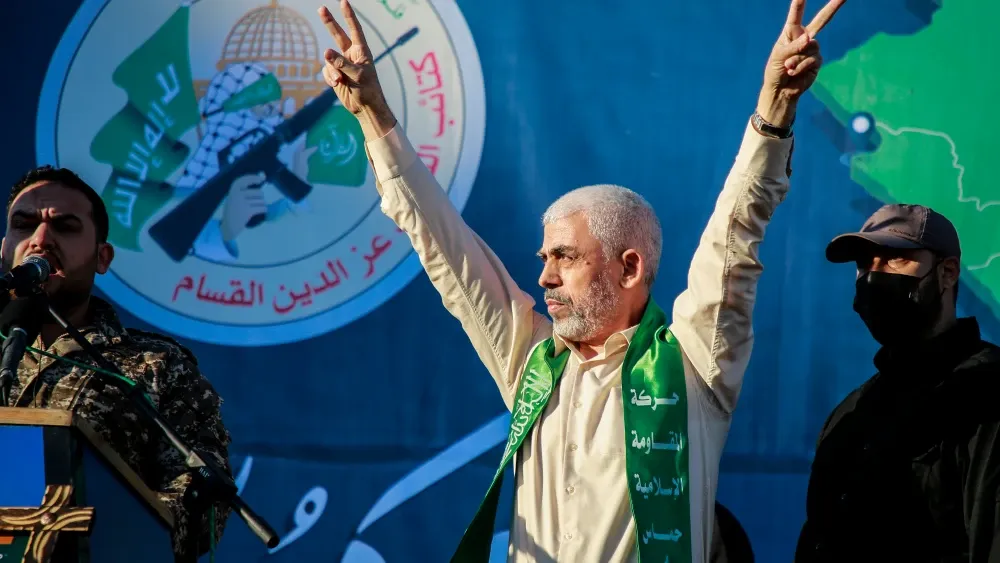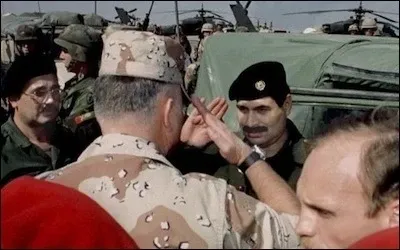| BREAKING News: Yahya Sinwar, the Hamas leader, has been eliminated, marking a significant turn in th |
| |  | | | Yahya Sinwar is Dead By Gregg Roman ● Oct 17, 2024 Smart Brevity® count: 2.5 mins...648 words BREAKING News: Yahya Sinwar, the Hamas leader, has been eliminated, marking a significant turn in the Israeli-Palestinian conflict. | | Sinwar's Death Challenges Ceasefire Logic  By Gregg Roman The death of Yahya Sinwar marks a pivotal moment in the Israeli-Palestinian conflict, raising questions about the effectiveness of ceasefire strategies. Why it matters: Sinwar's removal disrupts Hamas's leadership and highlights the limitations of ceasefires that militant groups exploit to regroup. -
Ceasefires, while offering temporary relief, have often empowered groups like Hamas to rebuild and escalate threats. -
Sinwar's rise post-2011 showcases how political concessions can inadvertently strengthen those committed to violence, prolonging conflict and escalating threats. The big picture: Historical examples, such as the eliminations of leaders like Bin Laden and Yassin, demonstrate that while removing key figures can disrupt operations, it doesn't eliminate underlying threats. -
These events emphasize the need for comprehensive strategies that address the ideological and operational foundations of militancy. -
Solely targeting leaders may lead to decentralization and the rise of new factions, as seen with Al-Qaeda and Hamas. What's next: A re-evaluation of conflict approaches is crucial, combining sustained security measures with diplomatic efforts to prevent ceasefire exploitation. -
Effective ceasefire agreements require robust monitoring and enforcement to prevent militant groups from gaining tactical advantages. -
Transparent communication and international collaboration are key to maintaining public trust and ensuring consistent pressure on militant entities. The bottom line: Ending organizations like Hamas requires more than leader elimination; it involves convincing militants that their war goals are unattainable, leading them to consider disarmament. -
Ceasefires should not be ends in themselves but tools managed carefully to prevent exploitation by militant groups. -
When ceasefires enable enemies to regroup rather than secure peace, they become dangerous illusions that delay victory and cost lives. | |  By Jonathan Speer Israel faces a critical choice between ending Hamas rule in Gaza and freeing Israeli hostages. Why it matters: The murder of hostages by Hamas has sparked public outrage, highlighting a deep divide in Israel's strategy. The big picture: Accepting a ceasefire deal could mean conceding a victory to Hamas, allowing it to remain the de facto authority in Gaza. What's next: Netanyahu must balance military objectives with public pressure for a ceasefire, while considering long-term regional stability. | | Archive: Why Arabs Lose Wars  By Norvell B. De Atkine Cultural and structural factors have historically inhibited the effectiveness of Arabic-speaking armies, impacting their performance in conventional warfare. Why it matters: Understanding these limitations is crucial for military strategists and policymakers aiming to enhance regional security. -
Despite economic, ideological, and technical barriers, cultural and societal attributes are pivotal in shaping military outcomes. -
These factors contribute to repeated challenges in military performance against better-organized adversaries. The big picture: Historical analyses reveal that Arab armies often excel in insurgent warfare, yet struggle with conventional battles due to centralized command structures and limited initiative. -
Over-centralization and a lack of flexibility are significant issues, with leadership often discouraged at the junior officer level. -
The success in insurgent tactics, as seen in the Egyptian crossing of the Suez in 1973, contrasts with failures in direct military engagements. Details: Training and educational practices contribute to the challenges faced by Arab militaries. -
The focus on rote memorization over critical thinking limits problem-solving abilities in dynamic combat situations. -
Information hoarding and lack of cross-training further inhibit operational effectiveness. What's next: Integrating cultural awareness into military training could bridge gaps in effectiveness. -
Emphasizing flexibility, innovation, and cross-training among ranks is essential for future improvements. -
Understanding and adapting to cultural dynamics within military frameworks can enhance strategic planning and execution. | | A longer edition covering the fallout and impact of Sinwar's death will be sent later this afternoon. Thank you, Gregg Roman
Director
Middle East Forum | | | | Feedback Please share your thoughts on this edition. Was this edition useful?  

Your responses are anonymous |        MEF, an activist think tank, deals with the Middle East, Islamism, U.S. foreign policy, and related topics, urging bold measures to protect Americans and their allies. Pursuing its goals via intellectual and operational means, the Forum recurrently has policy ideas adopted by the U.S. government.
Copyright © 2024 Middle East Forum, All rights reserved.
Our mailing address is:
Middle East Forum
1650 Market Street, Suite 3600
Philadelphia, PA 19103 | | | | | Powered by 
| | This email was sent by Middle East Forum via Axios HQ | | | |
0 коммент.:
Отправить комментарий